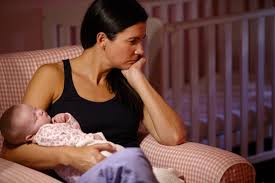An estimated 1 out of every 6 women will experience depression or anxiety after the birth or adoption of a child. This is referred to postpartum depression and anxiety (PPD/A) and can put it a significant amount of strain on a family. It can start anytime during the baby’s first year, but most common for the feelings to start during the first three weeks after birth.
What are the symptoms?
 Many mothers report feeling overwhelmed and not the typical, “Being a new mom is hard!” But rather “I can’t do this and I never will be able to.” They start questioning if they can handle being a mother or whether they should have become a mother at all.
Many mothers report feeling overwhelmed and not the typical, “Being a new mom is hard!” But rather “I can’t do this and I never will be able to.” They start questioning if they can handle being a mother or whether they should have become a mother at all.
Mothers also may have feelings of guilt because they feel they should be handling motherhood better than they are. They may feel like their baby deserves better or worry that the baby can tell how awful their mother is feeling.
Some mothers feel like they are unable to bond with their baby. There’s none of that “mommy bliss” that’s seen on TV or read in all the baby books.
There are deep feelings of sadness and anger. They have no patience and are very irritable. While others report feelings of “nothing.”
This is just a very small list of symptoms mothers’ experience. Some may feel many of the feelings listed above and others may not have any of these symptoms. (If you are currently experiencing any of the symptoms above, call your doctor.)
How is PPD/A Treated?
After discussing symptoms with a health care provider, he/she will be able to come up with a treatment plan depending on the severity of the depression and anxiety. A treatment program may include sessions with a therapist, social worker, psychologists or psychiatrists. Other patients may benefit from using anti-anxiety medications or simply just find peace in talking (or typing) in postpartum support groups.
The contents of this blog are for informational purposes only and do not constitute medical advice; the content is not intended to be a substitute for professional medical advice, diagnosis, or treatment. Always seek the advice of a physician or other qualified health provider with any questions you may have regarding a medical condition. In the event of a medical emergency, call a doctor or 911 immediately.